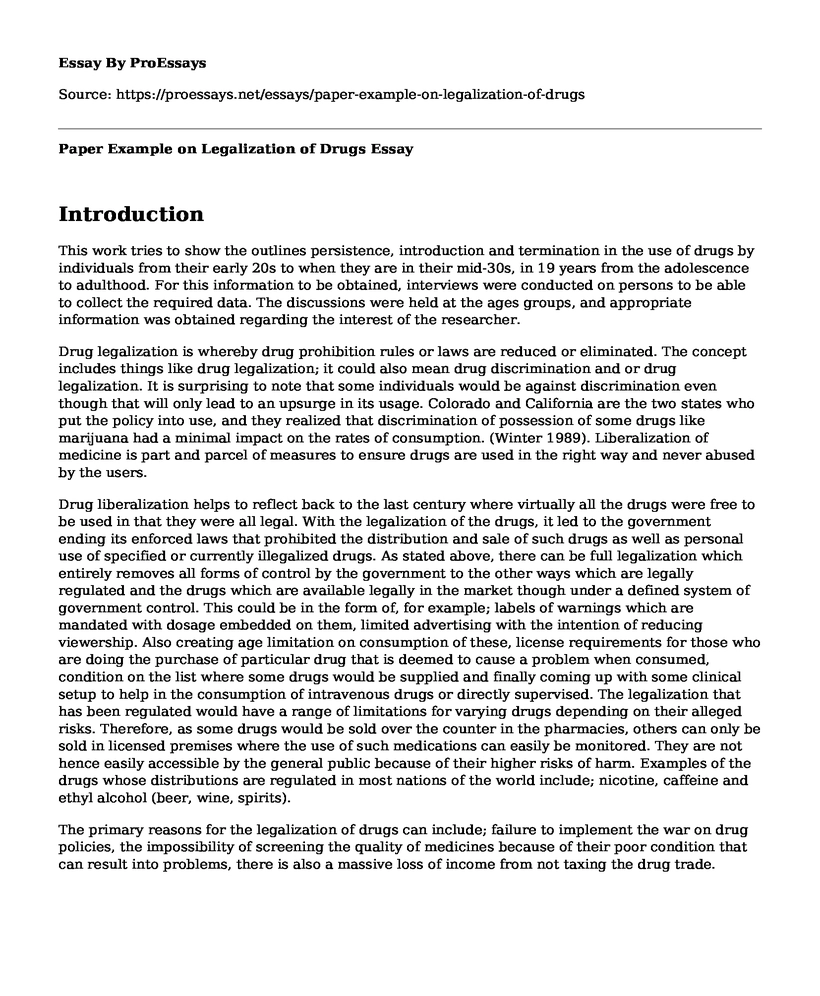Introduction
This work tries to show the outlines persistence, introduction and termination in the use of drugs by individuals from their early 20s to when they are in their mid-30s, in 19 years from the adolescence to adulthood. For this information to be obtained, interviews were conducted on persons to be able to collect the required data. The discussions were held at the ages groups, and appropriate information was obtained regarding the interest of the researcher.
Drug legalization is whereby drug prohibition rules or laws are reduced or eliminated. The concept includes things like drug legalization; it could also mean drug discrimination and or drug legalization. It is surprising to note that some individuals would be against discrimination even though that will only lead to an upsurge in its usage. Colorado and California are the two states who put the policy into use, and they realized that discrimination of possession of some drugs like marijuana had a minimal impact on the rates of consumption. (Winter 1989). Liberalization of medicine is part and parcel of measures to ensure drugs are used in the right way and never abused by the users.
Drug liberalization helps to reflect back to the last century where virtually all the drugs were free to be used in that they were all legal. With the legalization of the drugs, it led to the government ending its enforced laws that prohibited the distribution and sale of such drugs as well as personal use of specified or currently illegalized drugs. As stated above, there can be full legalization which entirely removes all forms of control by the government to the other ways which are legally regulated and the drugs which are available legally in the market though under a defined system of government control. This could be in the form of, for example; labels of warnings which are mandated with dosage embedded on them, limited advertising with the intention of reducing viewership. Also creating age limitation on consumption of these, license requirements for those who are doing the purchase of particular drug that is deemed to cause a problem when consumed, condition on the list where some drugs would be supplied and finally coming up with some clinical setup to help in the consumption of intravenous drugs or directly supervised. The legalization that has been regulated would have a range of limitations for varying drugs depending on their alleged risks. Therefore, as some drugs would be sold over the counter in the pharmacies, others can only be sold in licensed premises where the use of such medications can easily be monitored. They are not hence easily accessible by the general public because of their higher risks of harm. Examples of the drugs whose distributions are regulated in most nations of the world include; nicotine, caffeine and ethyl alcohol (beer, wine, spirits).
The primary reasons for the legalization of drugs can include; failure to implement the war on drug policies, the impossibility of screening the quality of medicines because of their poor condition that can result into problems, there is also a massive loss of income from not taxing the drug trade.
Conclusion
Being social, economic as well as political issue, full legalization has always been proposed by some groups who object to drug laws on moral grounds as regulated legalization are suggested by groups who oppose the drug laws with an argument that they fail to achieve the aims they stated and instead massively worsen the problems connected with the use of these prohibited drugs. It should be noted that drug legalization does not imply approval of drug use.
Reference List
Block, W. E., & Obioha, V. (2012). War on black men: Arguments for the legalization of drugs. Criminal Justice Ethics, 31(2), 106-120.
Cardoso, F. H., Gaviria, C., & Zedillo, E. (2009). The war on drugs is a failure. Wall Street Journal, 23.
Husak, D., & De Marneffe, P. (2005). The legalization of drugs. Cambridge University Press.
Cite this page
Paper Example on Legalization of Drugs. (2022, May 16). Retrieved from https://proessays.net/essays/paper-example-on-legalization-of-drugs
If you are the original author of this essay and no longer wish to have it published on the ProEssays website, please click below to request its removal:
- The Death Penalty in the US - Paper Example
- The Death Penalty and Capital Punishment Essay
- Essay on AFL: An Organizational Solution to Employer-Worker Conflict in US History
- Essay Sample on Cybercrime: The Melissa Virus & Social Engineering
- Essay Example on Jail vs. Prison: Comparing Roles in Corrections
- The U.S. vs. Bailey Case: Escape From Prison and Hard Prison Conditions
- Essay Example on Dream/Killer: True Story of Wrongful Conviction in 2015 Documentary







